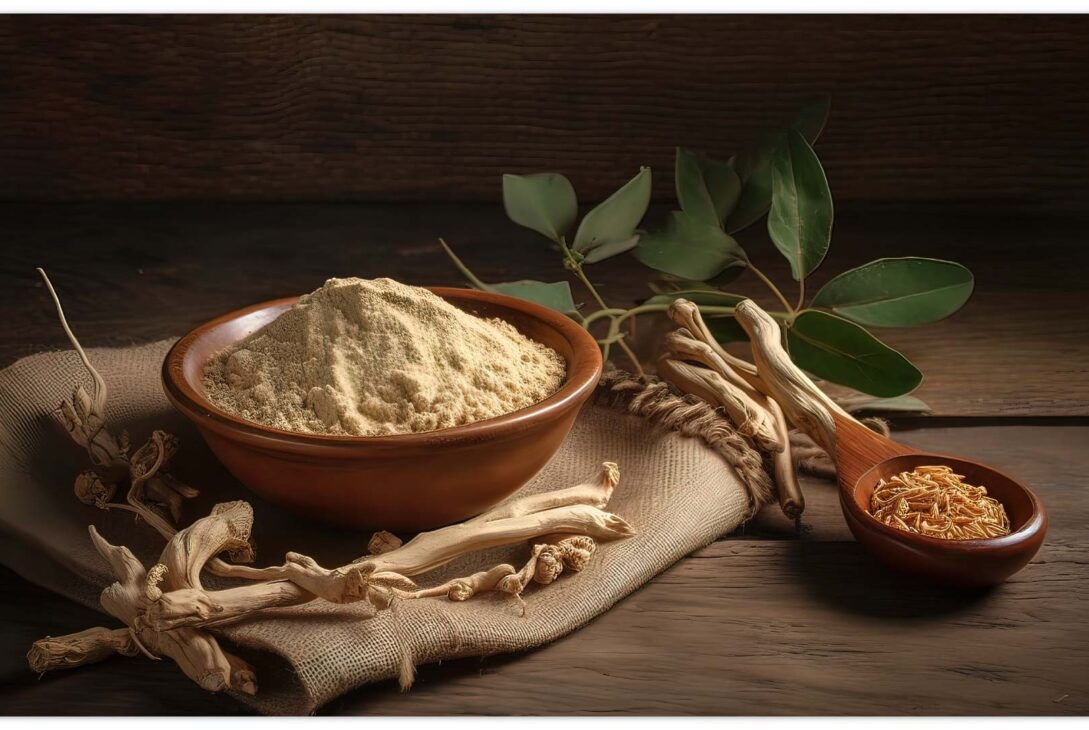Traditional Ayurvedic medicine contains the Ashwagandha plant as a herb that has gained widespread recognition because of its many health advantages.
The scientific name, Withania somnifera, represents the adaptogenic herb Ashwagandha, which Indian ginseng traditionally calls it because of its rejuvenation ability.
Ashwagandha brings multiple medicinal effects, including stress reduction and enhanced energy levels, which experts use to treat many health problems naturally. The consumption of ashwagandha brings both helpful and unhelpful effects, which accompany supplements.
The following article examines the benefits and downsides of Ashwagandha, therapy alongside potential medical advantages while presenting possible adverse health effects.
What Is Ashwagandha?
Ashwagandha originates as a small shrub in India, together with the Middle East and Africa. Throughout centuries, people have used the Ashwagandha plant parts to boost vitality and decrease mental stress, along with improving their general state of well-being.
The traditional Sanskrit name “ashwagandha” means “smell of the horse” because it describes both the plant’s scent as well as its sold capabilities to boost strength and endurability.
Current consumers can access ashwagandha through different product forms, which span from powders to capsules and teas, as well as gummies. People are increasingly using this adaptogenic plant because it enables the body to adapt to stress while preserving equilibrium.
Benefits of Ashwagandha
People often praise Ashwagandha because it offers various health advantages. While research is still ongoing, several studies suggest that this herb may offer the following advantages:
1. Reduces Stress and Anxiety
Stress management, along with anxiety relief, functions as one of the most recognized advantages of ashwagandha.
As a dietary adaptogen, Ashwagandha controls stress responses through its capacity to lower the stress hormone cortisol as well as keep cortisol levels in a balanced state.
Research indicates that ashwagandha produces significant anxiety reduction and creates better mood states among its users.
2. Boosts Energy and Stamina
People tend to use Ashwagandha as a natural remedy to fight tiredness because it enhances their daily energy output.
Supportive actions on the adrenal function and improvements to mitochondrial health might lead to better physical performance, along with longer endurance periods.
3. Improves Sleep Quality
Insomnia patients can find possible relief using ashwagandha together with people who experience substandard sleep quality.
Ashwagandha produces a soothing atmosphere that leads to better sleep patterns and rest thereby becoming the go-to medicine for people who suffer from sleep-related conditions.
4. Supports Cognitive Function
Research demonstrates that Ashwagandha increases memory function together with focus ability and cognitive performance. Antioxidants present in ashwagandha help prevent brain oxidative stress that contributes to cognitive loss.
5. Enhances Immune Function
The medicinal value of ashwagandha lies in boosting the immune system. White blood cell production is enhanced along with inflammation reduction due to ashwagandha, which allows the body to defend itself properly against infections and illnesses.
6. Balances Hormones
The aromatic plant Ashwagandha provides hormonal balance assistance to women and other users. The plant regulates thyroid activity, which enhances fertility treatment and reduces symptoms of menopause.
7. Neuroprotection
Research reviews demonstrate that ashwagandha could defend against the onset of Alzheimer’s and Parkinson’s disease, along with other neurological disorders.
Research showing the neuroprotective benefits of ashwagandha is less established than its stress-reducing properties, even though available information displays some positive signals.
8. Promotes Muscle Growth and Recovery
Athletes and fitness enthusiasts use ashwagandha as they believe it increases their muscular strength in combination with recovery performance. Several scientific investigations indicate that taking ashwagandha enhances muscle growth while decreasing body fat alongside better exercise outcomes.
Side Effects of Ashwagandha
Ashwagandha has various positive effects yet contains multiple side effects. Just like other dietary aids, ashwagandha might produce unwanted effects and influence prescription drugs. Here are some of the potential downsides to consider:
1. Gastrointestinal Issues
A few users of ashwagandha notice gastrointestinal problems that include stomach issues, diarrhea, and nausea whenever they consume the supplement.
The occurrence of side effects becomes more frequent when patients use higher amounts of ashwagandha for extended periods.
2. Drowsiness
A high dosage of Ashwagandha tends to create sleepiness and muscle lethargy as a side effect. The side effects may cause impairments to regular activities while requiring users to adjust their medication doses.
3. Interactions with Medications
The use of Ashwagandha can create interactions with sedative pills as well as thyroid medications combined with immunosuppressant drugs.
Before using ashwagandha, it is necessary to check with your healthcare provider if you are currently taking any prescription medications.
4. Not Suitable for Everyone
Pregnant and breastfeeding mothers should stay away from ashwagandha since scientists have not studied how it affects fetal growth or milk production.
People who have autoimmune diseases and thyroid disorders must exercise caution regarding ashwagandha consumption because it might lead to the worsening of their medical conditions.
5. Potential for Overuse
When taken according to directions, ashwagandha is safe for users, but taking too much or using it beyond recommended doses can generate negative results.
People should follow standard usage protocols and avoid home-based medicine consumption.
6. Liver damage
High amounts of ashwagandha intake occasionally lead to liver damage and potentially worsen its condition.
Users of ashwagandha-based products have rarely developed symptoms of liver damage, which include jaundice accompanied by severe itching and exhaustion.
The usage of ashwagandha seemed to harm patients, but this condition healed after they stopped consuming the product.
What Is Ashwagandha Used For?
Because it works on many different health issues, Ashwagandha is a widely selected traditional remedy. Here are some of the most common uses:
1. Stress and Anxiety Relief
People commonly use Ashwagandha as an organic treatment to tackle both stress and anxiety. The reduction of cortisol levels in the body through ashwagandha consumption produces an effective compound that lets users experience relaxation and mental clarity.
2. Energy and Vitality
Ashwagandha supplies natural energy levels to people who face tiredness or exhaustion. Ashwagandha functions as an effective remedy to treat chronic fatigue syndrome and increase overall health functioning.
3. Sleep Support
Ashwagandha proves beneficial for sleep quality improvements due to its calming properties, which attract many people to use it. The medicinal compound functions as an insomnia treatment while providing patients with restful sleep.
4. Cognitive Enhancement
Students and professionals alike turn to ashwagandha for its cognitive-enhancing properties. People use this herb because they think it helps memory function along with improving focus and mental clear thinking.
5. Immune Support
Protect yourself with ashwagandha supplementation during the times when cold and flu viruses spread. The immune-boosting attributes of ashwagandha protect individuals from infections as well as support general health maintenance processes.
6. Hormonal Balance
Ashwagandha helps control hormonal imbalances, which affect women who have menopause symptoms or thyroid disorders.
7. Fitness and Recovery
Exercisers, together with athletes, take ashwagandha to build their muscle tissues and make their exercise time longer while healing from workout injuries more quickly.
How to Use Ashwagandha Safely?
The strategic use of ashwagandha products will help people experience maximum benefits without encountering negative effects. Here are some tips for safe and effective use:
1. Start with a Low Dose
The gradual rise of your ashwagandha dose needs to start with a minimal quantity and then progressively build up to achieve the desired effect.
Checking how your body responds to ashwagandha enables you to detect side effects and avoid them.
2. Choose a Reputable Brand
All ashwagandha supplements do not share equal standards. Seek out viable ashwagandha supplements from well-known manufacturers who perform independent product testing to verify their quality and purity levels.
3. Follow the Recommended Guidelines
Consistently taking 300–500 mg of ashwagandha per day is advised according to most supplements; healthcare professional guidance is needed to deviate from this range.
4. Monitor for Side Effects
Note what reactions your body demonstrates while using ashwagandha. Monitor your reaction to ashwagandha, and if you encounter unfavorable effects such as digestive upset or sleepiness, you should either decrease the intake or stop taking it.
5. Consult a Healthcare Provider
Check with a healthcare provider to see if ashwagandha consumption is suitable for you and your health conditions if you take medications.
Your healthcare provider will guide you regarding the safety aspect and appropriateness of using ashwagandha based on your circumstances.
Final Thoughts
Ashwagandha functions as a strong plant-based medication that traditional medicine practitioners have used through generations.
People find its stress-reducing effects, better energy levels, and cognitive function improvements to be useful when adopting wellness practices.
You need to understand the drawbacks of ashwagandha because it can trigger digestive distress as well as drowsiness effects and conflicting drug reactions.
The safe utilization of ashwagandha depends on responsible supplementation choices together with measured use. The knowledge of how ashwagandha works for you and against you will help you choose a solution.
More Readings:
- Working Out With Kratom: Is It Worth It?
- Guide To Super Green Malay Kratom
- Akuamma Seeds vs Kratom: Which One Is Better?







